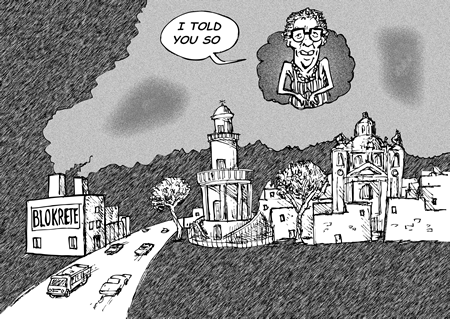The petition recently filed by a Maltese citizen on air pollution in Lija is an example of citizen power which can bring drastic changes to the way we live in Malta.
Mr Michael Zammit, a Lija resident, petitioned the European Commission to complain about the noise and dust produced by Blokrete Ltd, and the effect on nearby residents. In response, the EU Commission has confirmed that the particulate matter (PM10) emitted by the Blokrete Plant is causing pollution in excess of levels permitted under EU legislation. The EU Commission now knows and confirms what everybody in the country has known for the past 40 or 50 years.
The same industrial plant was the focus of on-and-off campaigns since the famous White Dust Case featured regularly on the pages of the Times of Malta in the 1960s. Mabel Strickland, who owned the newspaper, had every reason to champion Lija residents. She was one of them, and Lija was the heart of the electoral support base for her Progressive Constitutional Party, then in its death throes.
Coming back to the present, and the EC’s response appears to vindicate the current residents’ complaints. Surprisingly, the Commission offered nothing in the form of remedy; but if nothing else, hopefully this confirmation of the threat to Lija residents will serve to create an awareness of the standards of health and safety that all European citizens are expected to enjoy.
But the factory in question is but one of several examples of polluters in Malta, and the problem is certainly not restricted to the Lija area. Dust particles are also emitted by such health hazards as incinerators, and taken together, the overall result is that Malta suffers from a relatively high rate of respiratory problems, in particular asthma. And there are other forms of pollution apart from dust.
Consider cars, for instance. That Maltese people love their cars is an understatement. One need only look at the amount of vehicles on our congested roads, and the carbon monoxide these emit, to realise that reform in the transport sector is urgently required.
Accordingly, the announcement of the Maltese government to replace car registration tax with an environmentally friendly levy is a welcome green measure. This environmental measure is in keeping with the key green principle that polluter pays. Essentially, this measure rightly discriminates in favour of small cars and hybrid vehicles, whose emissions are least noxious.
The amount of registration tax paid by new and also second hand cars beggars belief. One need only compare euro prices on a like with like basis, which will be possible as of January 1, to realise just how overpriced cars are in Malta. The government measure seems to send a positive message that something is finally in the pipeline. It appears that the chosen road is to enforce a higher charge on cars according to their emissions. The question arises whether this measure will go far enough, and whether we should not also consider a number of other alternatives which will reduce congestion on our roads and pollution in the air we breathe.
Measures introduced in other countries include restricting the presence of cars in city centres to the first of every month, or to certain hours of the day in areas of historic or cultural sensitivity. These measures have generally met with the support of most people: an increasing number of whom are becoming more environment-conscious with the passage of time and the steady improvement of living standards.
Reforms in other countries also go as far as to restrict cars of a certain size from parking in certain parking areas. These measures and other similar ones are important because it is now clear that previous measures – such as increasing taxation or the price of petrol and diesel – have failed to reduce the number of cars on the road. Drastic measures may be needed to bring about a change in our car culture. But even basic, non-draconian reforms, such as an overhaul of our beleaguered public transport system – possibly with a view to introducing a monorail or underground train system, as has been separately suggested by Malta’s smaller parties – should make a significant difference to both the traffic congestion and the problem of air pollution.
The net result of these and other measures could well be the emergence of hybrid and smaller cars. And this is precisely what the country needs.
Positive discriminatory measures should be introduced with a view to encouraging people to change their car habits. The polluter pays system, if effectively enforced in our country, will lead to a much-needed upgrade in our lifestyle. After all, the Maltese public deserves no less.

